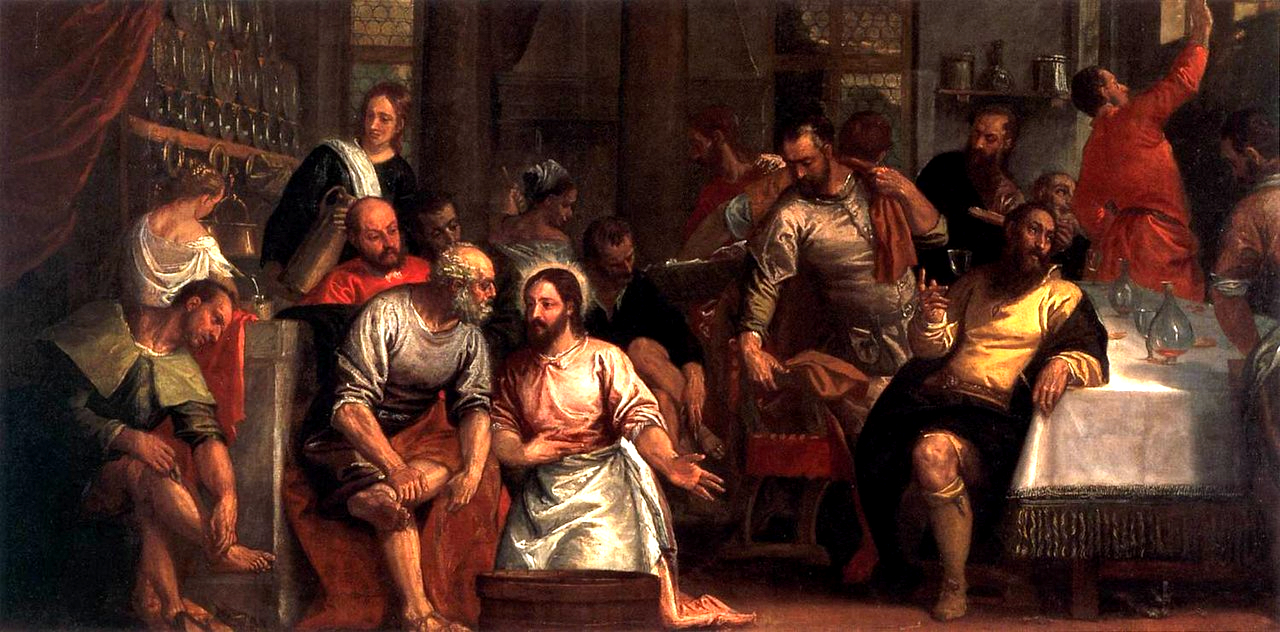Transcription of Sermon
A Reading from the Holy Gospel According to John.
When Jesus had washed the disciples’ feet, he said to them: “Amen, amen, I say to you, no slave is greater than his master nor any messenger greater than the one who sent him. If you understand this, blessed are you if you do it. I am not speaking of all of you. I know those whom I have chosen. But so that the Scripture might be fulfilled, The one who ate my food has raised his heel against me. From now on I am telling you before it happens, so that when it happens you may believe that I AM. Amen, amen, I say to you, whoever receives the one I send receives me, and whoever receives me receives the one who sent me.”
The Gospel of the Lord.
No slave is greater than his master
In the Name of the Father, and the Son, the Holy Ghost, Amen.
When our Lord is saying these words, “No one – no disciple – is greater than his master,” He’s saying this in the context of the Last Supper and this is the beginning, therefore, of His travail; the Holy Triduum, the Last Supper in which He institutes the priesthood, in which He institute’s the Eucharist. He leaves Himself for us forever, until the End of Days, in the Eucharist truly present; body, soul, and His humanity, and His divinity. And then He goes to suffer willingly. He goes to the Garden of Gethsemane, and you know the rest.
We just celebrated those days, in solemn fashion, in Holy Week remembering the Passion, and Death, and Resurrection of Our Lord. And Our Lord is saying that that is to be our life. We are called to that since no slave is greater than his master. And we are not just slaves, He has called us friends. A friend then shares in the life of his friend, but also in the sorrows, and in the pain, in the joys, the difficulties of a friend.
And this is why we see in our culture lots of anonymity. People like to isolate themselves because establishing a relationship with somebody else means that I enter into that other person’s life, and that means also entering into their sorrows, their pain, and there’s a huge responsibility that comes with that. And so, people like to sometimes protect themselves by not establishing these relationships, in the name of freedom. And nonetheless, what happens is we become true slaves in isolating ourselves, especially when we isolate ourselves from Christ. In the name of freedom, in the name of wanting to do what I want to do, we choose not to do His will. On the other hand, He tells us that His lot, what He underwent, becomes our story as well our life.
Today we remember, also, great martyrs, who consider themselves no greater than their master Jesus Christ. For example, we have the, over 40, English Martyrs who are celebrated today, from Tyburn. They were the first martyrs, some Carthusian monks, who were killed under Queen Elizabeth. This is the beginning of a terrible time for Catholics in England, and in Scotland, and in Ireland. And after that, this was a period of martyrdom that lasted 150 years. And after that period of martyrdom, Catholics were still second-class citizens in the United Kingdom, and they still suffer very much for being a sort of second-class citizen.
We also remember today the great martyrs of Spain, who were killed by the Communists at the beginning of the Spanish Civil War. The English killed the Carthusians and to start this series of horrible martyrdoms in Spain, they started with the Carmelites. And many don’t talk about it, but during the Spanish Civil War, the Communists, the Republicans, the Anarchists killed over 12,000 nuns, priests, and bishops. Nobody talks about that. And what an injustice to them, to hush that up, to not remember the sacrifice of these great martyrs, our big brothers and sisters who gave everything for Christ when they could have taken the easy way. They could have renounced Christ. They could have renounced their vocation. And those were only the religious. 12,000 nuns, priests, and bishops were killed in Spain during a period of three years. That’s not to mention all of the laity.
Our Lord is giving us a recipe for happiness in reminding us that we are to submit ourselves to Him. When we submit ourselves to Him, to His will, that’s where our freedom is. It sounds ironic. It sounds counterintuitive, but it’s in our obedience to His will that we find freedom. It’s in conforming our wills to His that we find the joy that only He can give us.
In the Name of the Father, and the Son, the Holy Ghost, Amen.
— Fr. Ermatinger

